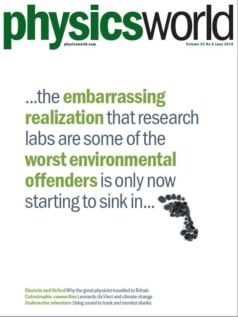The cover of the June 2019 issue of Physics World could not be more direct: the embarrassing realization that research labs are some of the worst environmental offenders is only now starting to sink in.

It’s the simple message from the lead feature in the new issue of Physics World, which examines how many scientific laboratories are terrible at wasting energy and resources. Fortunately, there are initiatives to improve the situation – and to see tips to make your lab greener, check out the feature by Benjamin Skuse.
Elsewhere in the issue, you can find out why the world’s greatest physicist Albert Einstein came to the University of Oxford three times in the 1930s, discover what Leonardo da Vinci has to do with climate change, and see why physicists must do a much better job at using videos to teach students.
You can enjoy the June 2019 issue of Physics World magazine via our digital apps for iOS, Android and Web browsers (membership of the Institute of Physics required). Let us know what you think about the issue on Twitter, Facebook or by e-mailing us at pwld@iop.org.
For the record, here’s a run-down of what’s in the issue.
• NASA contractor hit with $47m fine – Falsified tests by a US metals manufacturer were behind the failure of two high-profile climate missions, as Peter Gwynne reports
• Transformative thinking – Best known for his work on invisibility cloaks and “transformative optics”, Ulf Leonhardt from the Weizmann Institute of Science in Israel talks to Joe McEntee about science in Israel, his career – and his new novel
• The master of disaster – Leonardo da Vinci died 500 years ago, but his work contains clues for how to think about the modern problem of global warming, finds Robert P Crease
• Patently obvious – James McKenzie explains why physicists who want to succeed in business must nail down their intellectual property rights
• Rutherford’s legacy – With the International Year of the Periodic Table of Elements in full swing, John Campbell celebrates the immense contribution of Ernest Rutherford, who first split the atom 100 years ago
• Leading by example: going green in the lab – With so much research focused on creating technologies that reduce our collective carbon footprint, the embarrassing realization that research labs themselves are some of the worst environmental offenders is only now starting to sink in. Benjamin Skuse examines the problem and what is being done to solve it
• Einstein in Oxford – Amid growing political unrest in Germany, Albert Einstein paid three short visits to Oxford in the early 1930s. Andrew Robinson reveals why this celebrated physicist travelled to Britain and how Einstein seduced – and then shocked – his audiences with his new thinking about how science works
• Listening for sharks – Pelagic thresher sharks are a sight to behold, but their numbers are dwindling as a result of illegal hunting and fishing. Now, however, scientists are using acoustics to learn more about these animals’ behaviour and how they can be better protected. Louise Murray looks under the surface
• Black holes and revelations– Andrew Robinson reviews Gravity’s Century: From Einstein’s Eclipse to Images of Black Holes by Ron Cowen
• Solve for X –Ian Randall reviews All of Physics (Almost) in 15 Equations by Bruno Mansoulié
• A versatile technology – Julia Zimmermann, co-founder of the German start-up firm Terraplasma, speaks to Julianna Photopoulos about how a desire to develop applications for cold atmospheric plasmas led her to co-found a family of companies
• Once a physicist: Ben Cowie – meet the man who opened a cycling specialist shop and cafe in Ontario, Canada, in 2017.
• Video versus the blackboard – Manuela Ramos Marques da Silva and Pedro Sidónio Pereira da Silva explain why we need to do a much better job creating high-quality physics videos for students as that’s the way many people now learn.



